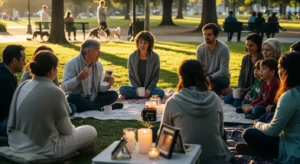As conversations about mortality become more open in modern culture, new approaches to death and dying are gaining visibility. One of the most important shifts is the emergence of death doulas and holistic aftercare providers. In 2025, these roles are helping families navigate the emotional, logistical, and spiritual aspects of end-of-life care with dignity and compassion. Just as birth doulas support families during childbirth, death doulas accompany individuals and loved ones through life’s final transition.
What Is a Death Doula?
 A death doula, sometimes called an end-of-life doula, is a nonmedical professional who guides the dying and their families. Unlike doctors or hospice nurses, doulas focus on emotional, spiritual, and practical support. Their services can include:
A death doula, sometimes called an end-of-life doula, is a nonmedical professional who guides the dying and their families. Unlike doctors or hospice nurses, doulas focus on emotional, spiritual, and practical support. Their services can include:
- Listening and offering presence at the bedside
- Helping create rituals, music, or legacy projects
- Supporting family members in grief conversations
- Coordinating with medical staff, clergy, or funeral directors
- Providing resources for aftercare, memorial planning, and grief groups
Their goal is to reduce fear, bring peace, and provide continuity of care in a process that is often fragmented or medicalized.
Why Death Doulas Are Rising in Popularity
Several cultural and societal factors are driving the growth of this profession:
- Personalized care: Families increasingly want options beyond traditional funeral models.
- Closing support gaps: Hospice provides medical support, but many families still feel emotionally unprepared. Doulas bridge that gap.
- Changing demographics: An aging population means more households are facing end-of-life questions.
- Destigmatizing death: Death cafés, podcasts, and open discussions have normalized end-of-life planning.
- Holistic approaches: A growing interest in wellness and whole-person care now extends to dying.
These influences show why doulas are becoming a standard part of end-of-life conversations in 2025.
Holistic Aftercare: Extending Support Beyond the Funeral
 Aftercare is the ongoing support that families receive after a death has occurred. Unlike traditional models that end with burial or cremation, aftercare provides continuity. Modern aftercare services include:
Aftercare is the ongoing support that families receive after a death has occurred. Unlike traditional models that end with burial or cremation, aftercare provides continuity. Modern aftercare services include:
- Grief counseling check-ins: Regular calls or visits to help families adjust.
- Legacy archiving: Creating memory books, online tribute pages, or digital archives.
- Community circles: Peer groups that meet weekly to share experiences of loss.
- Ritual design: Personalized ceremonies held weeks or months after the funeral.
In this way, doulas and aftercare professionals help keep memories alive while easing long-term grief.
Challenges Facing the Death Doula Movement
Despite growing popularity, this field faces challenges:
- Standardization: Training programs vary; there is no universal certification.
- Accessibility: Services are often private and not covered by insurance.
- Cultural sensitivity: Rituals must align with diverse cultural, religious, and spiritual traditions.
- Integration: Medical teams and doulas sometimes struggle to coordinate roles.
These issues highlight the need for stronger advocacy, clearer guidelines, and community education.
Benefits for Families
Families who work with death doulas often report reduced anxiety, better communication, and a sense of peace. Benefits include:
- More meaningful goodbyes and closure
- Guidance through difficult medical and legal decisions
- Structured memorial projects that celebrate life
- Resources for navigating grief weeks and months later
These benefits demonstrate how doulas help restore humanity to one of life’s most difficult moments.
How This Trend Connects to Online Obituary Platforms
For readers of NewDeaths.com, the rise of death doulas matters because it shapes how we honor lives online. Families may seek not only obituary space but also digital legacy support, grief circles, and resources that extend past a single announcement. By covering these trends, we can help readers find tools to manage grief, build community, and celebrate life more fully.
Internal resources to explore:
Steps for Families Considering a Death Doula
- Research local doulas and ask about training or experience.
- Discuss goals: bedside presence, ritual creation, aftercare, or all three.
- Clarify costs and whether services are hourly or package-based.
- Coordinate with hospice or medical staff for smooth collaboration.
- Consider integrating aftercare into memorial plans for long-term healing.
Looking Ahead
In 2025 and beyond, death doulas and aftercare providers are helping reshape how we view mortality. Instead of silence and stigma, families are choosing presence, ritual, and dignity. These holistic approaches honor not just the end of life but the community that remains. By embracing such services, we expand our capacity for compassion and rewrite how we handle loss.
External Resource: To learn more about end-of-life doula training and standards, visit the
International End-of-Life Doula Association.
NewDeaths.com will continue to highlight resources and practices that bring dignity to dying and healing to those who grieve.
